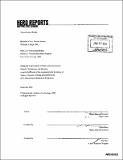Hero Reports : mapping civic courage
Author(s)
Wright, Alyssa Pamela
DownloadFull printable version (61.68Mb)
Alternative title
Mapping civic courage
Other Contributors
Massachusetts Institute of Technology. Dept. of Architecture. Program in Media Arts and Sciences.
Advisor
Pattie Maes.
Terms of use
Metadata
Show full item recordAbstract
Hero Reports extends the rationale of New York City's "See Something, Say Something" campaign-an alert public can be a good security measure. The current political climate within the United States translates the MTA's tactics into ones of fear. Instead of fostering collective security, these calls for vigilance create rifts between people and communities. An unhealthy impact of the "See Something, Say Something" campaign encourages people to look at each other with heightened and prejudicial suspicion. Although other projects have sought to interrogate the tactics of such citizen-detective campaigns, they do not provide productive alternatives. Because of this, projects seeking to deflect fear, only serve to reify and preserve its power. An alternative technology is needed to effectively destabilize the message of fear inherent in the MTA campaign. Hero Reports counterbalances the vigilance associated with suspicion and Othering with measures of positive and contextual alertness. It is a technology that builds communities that are truly, and collectively, empowering. Hero Reports provides this alternative first by aggregating stories of everyday heroism, and then by thematically, geographically and temporally mapping them. By linking and contextualizing discrete moments of heroism, Hero Reports promotes a public discourse about how we create, enforce and value social norms. Balancing the empirical ways we measure crime, Hero Reports provides the groundwork for determining the empirical parameters for heroism.
Description
Thesis (S.M.)--Massachusetts Institute of Technology, School of Architecture and Planning, Program in Media Arts and Sciences, 2008. Includes bibliographical references (leaves 89-96).
Date issued
2008Department
Program in Media Arts and Sciences (Massachusetts Institute of Technology)Publisher
Massachusetts Institute of Technology
Keywords
Architecture. Program in Media Arts and Sciences.